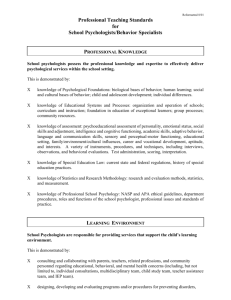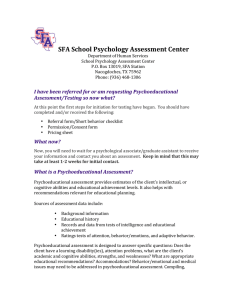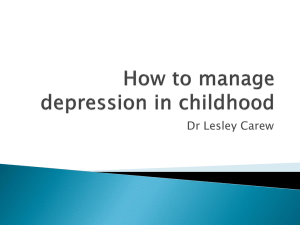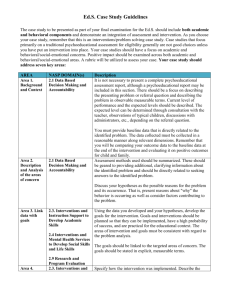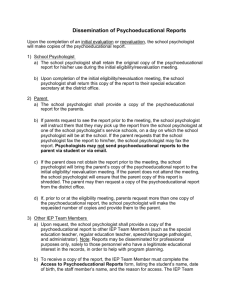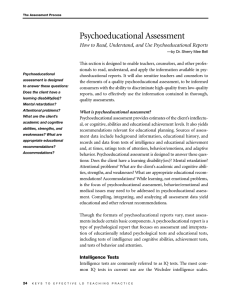AN INTRODUCTION FOR PARENTS/CAREGIVERS TO PSYCHOEDUCATIONAL ASSESSMENT
advertisement
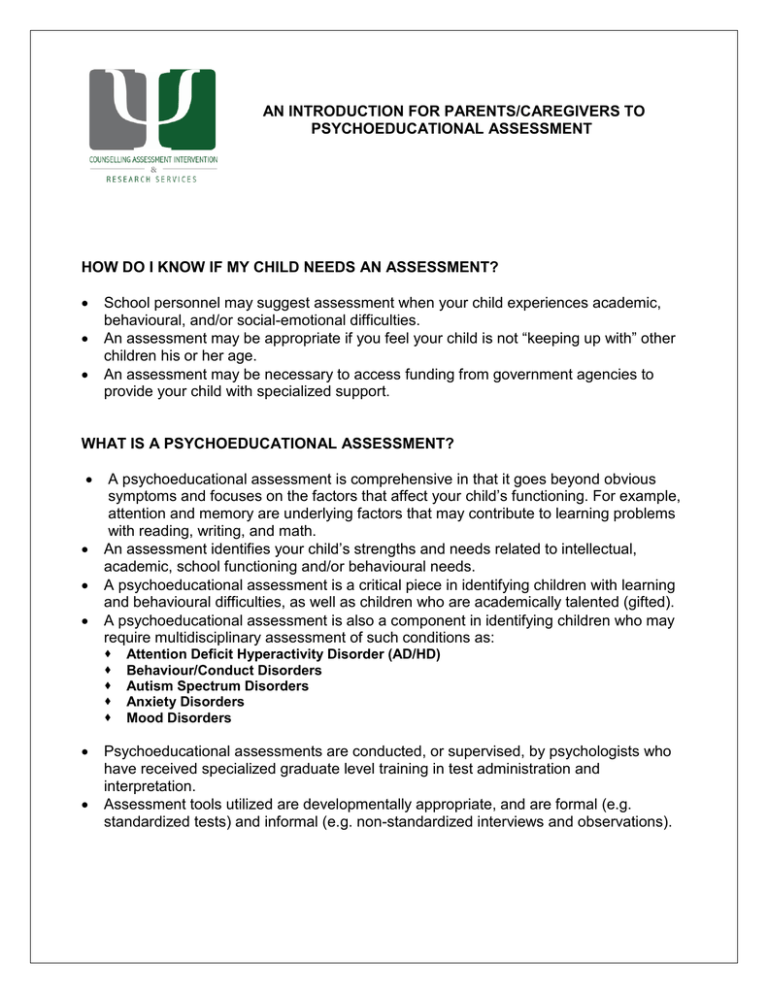
AN INTRODUCTION FOR PARENTS/CAREGIVERS TO PSYCHOEDUCATIONAL ASSESSMENT HOW DO I KNOW IF MY CHILD NEEDS AN ASSESSMENT? School personnel may suggest assessment when your child experiences academic, behavioural, and/or social-emotional difficulties. An assessment may be appropriate if you feel your child is not “keeping up with” other children his or her age. An assessment may be necessary to access funding from government agencies to provide your child with specialized support. WHAT IS A PSYCHOEDUCATIONAL ASSESSMENT? A psychoeducational assessment is comprehensive in that it goes beyond obvious symptoms and focuses on the factors that affect your child’s functioning. For example, attention and memory are underlying factors that may contribute to learning problems with reading, writing, and math. An assessment identifies your child’s strengths and needs related to intellectual, academic, school functioning and/or behavioural needs. A psychoeducational assessment is a critical piece in identifying children with learning and behavioural difficulties, as well as children who are academically talented (gifted). A psychoeducational assessment is also a component in identifying children who may require multidisciplinary assessment of such conditions as: Attention Deficit Hyperactivity Disorder (AD/HD) Behaviour/Conduct Disorders Autism Spectrum Disorders Anxiety Disorders Mood Disorders Psychoeducational assessments are conducted, or supervised, by psychologists who have received specialized graduate level training in test administration and interpretation. Assessment tools utilized are developmentally appropriate, and are formal (e.g. standardized tests) and informal (e.g. non-standardized interviews and observations). HOW LONG DOES AN ASSESSMENT TAKE? As the process is comprehensive, 4 hours of initial assessment to identify broad areas of need is usually required. Further assessment may be necessary to clarify factors affecting your child’s level of functioning (e.g. Visual-motor skills, language skills, memory deficits) Test interpretation and report preparation requires additional clinical time. WHAT INFORMATION DOES AN ASSESSMENT PROVIDE? A comprehensive assessment pinpoints your child’s strengths and areas of need and provides practical recommendations for successfully managing intellectual, learning, behavioural and/or social-emotional differences. The information obtained is consolidated into a formal report that is provided to you. The psychologist will explain the results to you in understandable terms. Upon parental request, a copy of the assessment report can be forwarded to the appropriate professionals (e.g. family doctor, school personnel) when needed. HOW AM I INVOLVED IN THE ASSESSMENT? You are the expert on your child. Information you provide through interview and questionnaires will be invaluable in developing a picture of your child in his or her world. Prepare your child for assessment by letting him or her know that he/she is coming to work with someone whose job it is to, for example, look at how he/she learns, why school is hard, how we can make it easier. Ensure your child is well rested and well nourished before he/she comes for assessment. This will help your child to be relaxed and perform at his/her best. Ensure your child has taken any regular medication and is wearing his/her glasses if required. Adapted from: Hill Psychological Services R. (Lynde) Hill, M.Sc. Registered Psychologist #739 Revised April 2014
